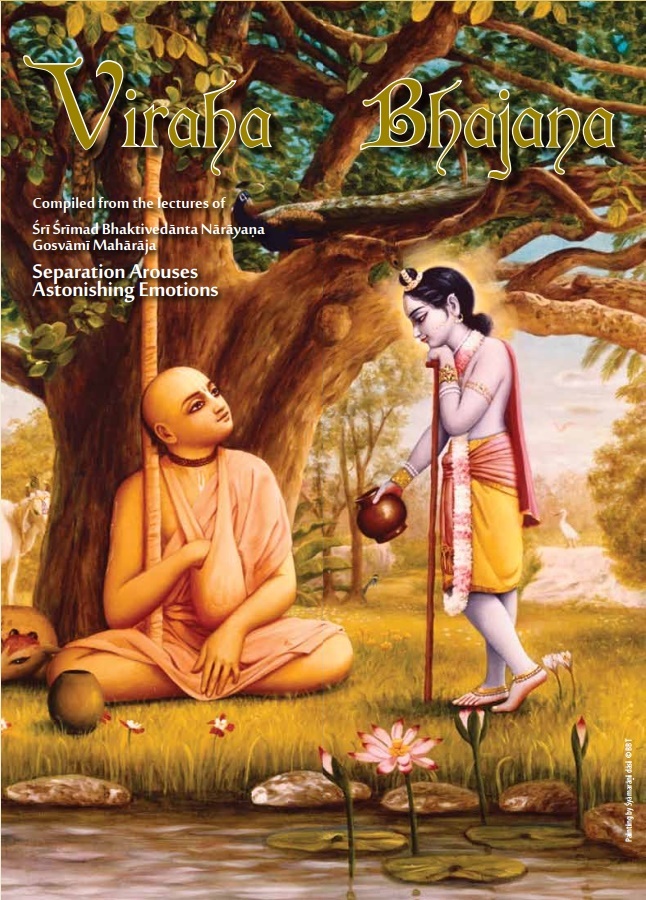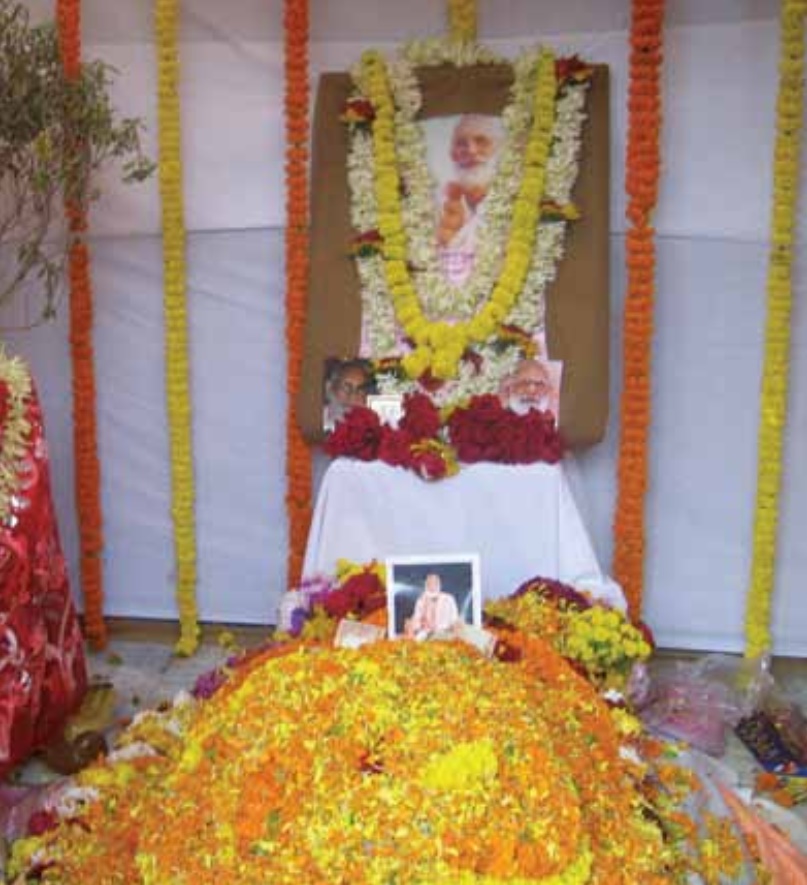Viraha-bhajana
Compiled from the lectures of Śrī Śrīmad Bhaktivedānta Nārāyaṇa Gosvāmī Mahārāja


Separation Arouses Astonishing Emotions
Śrī Bhagavān is the possessor of all potencies, and therefore His relationship with His internal potency is indestructible (śakti-śaktimatayor abhedaḥ); they are always inseparable. Still, His pastime potency, which makes the impossible possible, manifests separation (viraha), even in eternal meeting. Its purpose is to arouse astonishing varieties of rasa (rasa-vaicitrya). This is one of the unprecedented stages of prema.
The first sprout of the wish-fulfilling tree of prema in this world was Śrīla Mādhavendra Purīpāda. He sang an unparalleled verse in his state of perfection.
mathurā-nātha kadāvalokyase
hṛdayaṁ tvad-aloka-kātaraṁ
dayita bhrāmyati kiṁ karomy aham
O Master, whose heart melts in compassion for the destitute! O Lord of Mathurā! When will I see You again? O beloved Lord of My life, I fervently hanker to see You, so much so that My heart has become intensely restless. What shall I do now?
This verse was originally manifested by Śrīmatī Rādhikā in the agony of Her separation from Śrī Kṛṣṇa when He went to Mathurā. Thus Mādhavendra Purīpāda planted in this world the seed of devotion in the amorous sentiment. This śloka is the outpouring of Śrīmatī Rādhikā’s mahā prema (mahābhāva) after Kṛṣṇa left for Mathurā. Bhajana performed following Śrīmatī Rādhikā’s mood in this condition constitutes the topmost bhajana.
Feeling Separation is Essential for the Sādhaka
For the practitioner of bhakti, it is natural to perform bhajana in a mood of separation from Kṛṣṇa. The devotees of śṛṅgāra-rasa, feeling themselves to be the most destitute, call out fervently to dīna-dayārdra nātha Kṛṣṇa, the Lord of the destitute.
Only three persons could taste the essence of this verse: Śrīmatī Rādhikā Herself, Śrīla Mādhavendra Purī and Śrīman Mahāprabhu (who is Kṛṣṇa covered by the complexion and sentiments of Śrīmatī Rādhikā). To manifest this śloka, Śrīla Mādhavendra Purī, an eternal follower of Śrī Rādhā, has imbibed the emotions of mathurā-virahiṇī Śrī Rādhā.
Śrī Gauracandra says,
śūnyāyitaṁ jagat sarvaṁ govinda-viraheṇa me
O sakhī, in separation from Govinda, even a moment seems like a millennium. Tears pour from My eyes like torrents of rain in the monsoon season and this entire world seems void.
kālo mayātigamitaḥ kila sāmprataṁ hi
tvaṁ cet kṛpāṁ mayi vidhāsyasi naiva kiṁ me
prāṇair vrajena ca varoru bakāriṇāpi
O Varoru (girl with beautiful thighs), I am passing my time with the sole hope of being able to serve You. If You withhold Your mercy, what value to me are this life, the land of Vraja, and Śrī Kṛṣṇa, the enemy of Baka?
Without receiving the mercy of Śrīmatī Rādhikā, it is impossible to attain the mercy of Śrī Kṛṣṇa. But when one’s heart becomes extremely restless for Her mercy, then the mercy of Rādhānātha Śrī Kṛṣṇa becomes easily accessible.
Śrī gurudeva is the identical manifestation of Śrīmatī Vṛṣabhānu-nandinī, the crest jewel of āśraya-tattva (those who are the abode of love for Kṛṣṇa). Śrī gurudeva expertly adopts the means devised by the sakhīs for serving the Divine Couple in Their transcendental love-laden pastimes. For this reason, he is extremely dear to Śrī Rādhā and Śrī Kṛṣṇa. How will one receive the mercy of Śrī Kṛṣṇa if he is not receiving the mercy of a guru on this level? Therefore, those who remain under the shelter of śrī guru will experience intense waves of separation from him when he is no longer manifest, and those waves will surely increase to their utmost magnitude.

Attachment Intensifies Through Separation
Out of compassion, Śrī Bhagavān, in the form of śrī guru, expands His manifest pastimes. In the same way, śrī guru enacts the pastime of disappearing from this world to enter his eternal pastimes. His sole purpose in doing so is to stimulate the full service and full possessiveness of his dependents. Those fortunate enough to have taken shelter of a rūpānuga-guru during his manifest presence, experience a constant increase in their attachment to serving him. And after his disappearance, their attachment to him continues to increase many times over. Consequently, the fire of separation from him intensifies day by day; by this alone one’s bhajana remains ever-fresh.
There are two kinds of bhajana. The first is performed by chanting and remembering pastimes of separation (vipralambha-līlā) and the second is performed by remembering pastimes of meeting (sambhoga-līlā). Although the gopīs and Vrajavāsīs always prefer meeting with Kṛṣṇa over separation from Him, He plays with them by making them enjoy vipralambha-rasa.
The sādhaka should cultivate the mood of separation from Kṛṣṇa by thinking, “I am not seeing Kṛṣṇa, nor am I seeing Śrīmatī Rādhikā, nor Vraja. I am not realizing anything and I am unable to serve my gurudeva.”
The Height of Intense Separation
Raghunātha dāsa Gosvāmī showed us how to feel separation from Kṛṣṇa, and especially from Śrīmatī Rādhikā. A sādhaka should be immersed in such feelings. Śrīla Raghunātha Gosvāmī also lamented in separation from his śikṣā-gurus, “I am so unfortunate! First Śrī Caitanya Mahāprabhu departed from this world, leaving me behind. I then lived in the constant association of Śrī Svarūpa Dāmodara, but he also left this world. Next I caught hold of Śrī Gadādhara Paṇḍita’s lotus feet, but he also departed. From then on I experienced that every place and every dust particle of Jagannātha Purī reminded me of Śrī Caitanya Mahāprabhu, Svarūpa Dāmodara, Gadādhara Paṇḍita and their associates; and therefore I left Purī to come to Vṛndāvana.”
In Vraja, Śrīla Dāsa Gosvāmī performed bhajana at Rādhā-kuṇḍa under the guidance of Śrīla Rūpa and Śrīla Sanātana Gosvāmīs. When Śrīla Rūpa Gosvāmī entered his unmanifest pastimes, Śrīla Dāsa Gosvāmī lamented as follows in separation from him:
vyāghra-tuṇḍāyate kuṇḍaṁ jīvatu rahitasya me
Now that I am without that person who sustains my life, the land of Vraja seems empty and desolate, Govardhana Hill appears like a great python, and Rādhā-kuṇḍa appears like the gaping mouth of a tigress.
Who Can Realize Separation from Guru?
Although our gurudeva has also entered his unmanifest, eternal pastimes, we happily remain in this world. On the occasion of special days, like his appearance or disappearance day, we might remember him, but often we are involved in arranging the festival in his honour, and there is very little chance to contemplate our separation from him. A tear may come to our eye as we speak something about him; but it may not come. If the festival is very elaborate, there is much to manage, such as the abhiṣeka, guru-pūjā and distribution of mahā-prasādam to the Vaiṣṇavas. Consequently, there is less chance of us finding time to think about him and weep. For the most part, we arrange these festivals for the benefit of the general people who have no intimate connection with him, but on that day we should ensure that a feeling of separation from him enters our own hearts. This is called bhajana.
Special persons, who have realized their immense obligation and indebtedness to gurudeva for all they have received from him, and who have rendered profuse service to him with viśrambha-bhāva (spontaneous intimacy) will feel separation from him, and weep. Such devotees will not think, “I am so lowly and my gurudeva is so elevated.” One with such awe and reverence cannot weep.
Śāstra states, “viśrambhena guror sevā – the sevaka performs such intimate service to gurudeva that gurudeva is always pleased with him.” The guru will not see him as his servant or disciple for a single moment, but instead he will see him as his own heart. Śrī Īśvara Purīpāda (a disciple of Śrīla Mādhavendra Purī) and Govinda (a disciple of Śrī Īśvara Purī) were servants of this calibre. Although such a relationship with śrī guru is rare, it is absolutely necessary for rāgānugā-bhakti. In its absence, we are unable to weep like Śrīla Raghunātha dāsa Gosvāmī.
Gradations of Separation
A devotee will experience different degrees of separation from gurudeva, according to his level of bhakti. When we contemplate the mercy he showed us and his superiority to us, we feel a certain type of sentiment. But when we recall our intimate relationship with him and his immense love for us, we will weep for him incessantly.
Nanda Bābā weeps in separation from Kṛṣṇa, but Yaśodā Mā can weep more than Nanda Bābā can. The gopīs, however, can even weep considerably more than Yaśodā. This is because they have a more intimate relationship with Kṛṣṇa. We should have such an intimate relationship with our gurudeva, Śrī Kṛṣṇa, Śrīmatī Rādhikā, Śrī Rūpa Mañjarī, Śrīla Rūpa Gosvāmī and all such personalities. It is then that we will be able to weep for their mercy. Without that intimate service-relationship with our gurudeva, there is no possibility of us imagining our relationship with Śrī Rūpa Mañjarī or Śrīmatī Rādhikā and Kṛṣṇa.
Our advancement is solely dependent on the intensity of our service to our gurudeva. It is the platform on which all other relationships and experiences develop. If we can weep for gurudeva, we will be able to weep for Śrīmatī Rādhikā; and if we cannot weep for him, we will not be able to weep for Her. Whatever we have learned we have learned from our gurudeva, and we should weep for him from the core of our hearts.
How to Lament
How shall we weep? Śrī Caitanya Mahāprabhu has given instructions, as below:
vadanaṁ gadgada-ruddhayā girā
pulakair nicitaṁ vapuḥ kadā
tava nāma-grahaṇe bhaviṣyati
O Lord, when will tears flow from my eyes, my voice falter and all the hairs on my body stand erect as I chant Your holy names?
“When will I feel so much lamentation that I weep while chanting the names Hare Kṛṣṇa, Rādhā-Govinda or Vṛndāvaneśvarī?” Weeping like this is our dharma, the essence of our religious principles. One day, by the mercy of those who sincerely feel this mood of separation, and by the grace of our gurudeva and our guru-paramparā, we will have realization of this fact. This is our real prayer, and while praying, our mood should be “tava nāma-grahaṇe bhaviṣyati – when will I weep while chanting harināma and remembering and hearing Your pastimes?” Those who are most fortunate can lament and weep for these moods and thereby experience them.
While softly uttering harināma, chanting harināma, praying to harināma, or simply while remembering harināma, we should experience a mood of separation. If we are not yet doing this, we will have to gradually develop this mood in our practice of sādhana-bhakti. By reading about the pastimes of Śrī Caitanya Mahāprabhu and His associates, their moods of separation will enter our hearts and someday we will also experience them. Realization is the result of remembering śrī gurudeva; therefore we should always remember him. If we do not understand the mercy of gurudeva, we will not understand anything.
Our Ultimate Goal
Śrīla Bhaktisiddhānta Sarasvatī Ṭhākura Prabhupāda writes that meeting and separation eternally stand side by side. Only that person who has some realization of vipralambha (separation) can relish and serve sambhoga-līlā (the meeting of Rādhā and Kṛṣṇa). One who has not tasted vipralambha cannot relish sambhoga-līlā. The main objective, or the ultimate goal, of our sādhana-bhajana is to attain realization of the mood of separation. Once that is achieved, all else can be realized.
Published in Rays of The Harmonist
(No. 15 Kārttika 2005)
